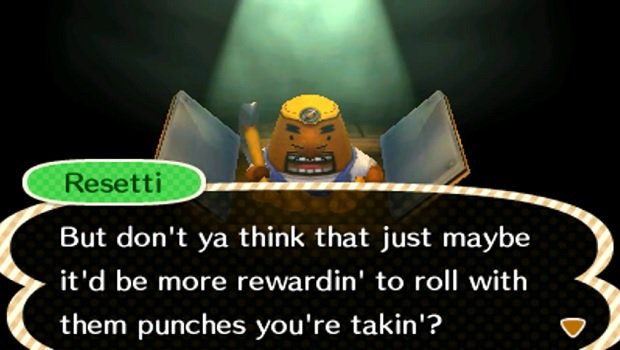Why I Love: Mr. Resetti
My first experience with Animal Crossing dates back to the time I rented the GameCube version from my local Blockbuster Video. The whole concept of a game as free-form as Animal Crossing was completely new at the time, rare as it was to find a game which adhered so rigidly to a real-world clock, a virtual town that changed so dramatically based on the passing of the seasons. I didn't quite understand what I was getting myself into with this cartoonish simulacrum of real life, so I wandered around, pulling weeds, catching bugs, making friends with the locals, and just kind of soaking it all in.
And then I met Mr. Resetti, and I think it's the first time a video game ever gave me a real, honest talking-to.
I don't remember exactly how it happened - I'd probably been playing in the morning and had to go to school - but I'd turned the system off without saving. This is a big no-no in Animal Crossing, as the game is built around the passing of actual time. Rather than periodically autosaving, Animal Crossing requires that you save your game before you turn it off. This locks in all of the changes you've made to the world, as well as all of your interactions with the town's citizens. Failing to save basically means all of your progress is undone, and less scrupulous players can use this to their advantage if they don't like how the events of their play session panned out. The game reminds you to save before logging off while you're playing, but the gravity of the consequences don't really set in until you hit that reset button for the first time (or simply forget to save your game before turning it off). When you log back into your save file, you're greeted by an angry mole with a chip on his shoulder for save scummers:
Holy crap. This is new. Video games - Nintendo games in particular - are full of warnings and suggestions. Don't remove your memory card while saving. Don't forget to take a break every hour. Use the wrist strap when playing with the Wii Remote or you'll break your TV. I'm looking at you, Steve. Sometimes there are consequences to these actions, but they're usually a result of the technology buckling under the weight of human error, rather than a direct admonition from the game itself.
But Mr. Resetti doesn't just explain to you why what you did was wrong, he scolds you at length. His rants take several minutes to scroll through, and they get progressively angrier and longer the more you reset the game. "Are you testin' me," he exclaims after the fourth time you've hit the reset button. "You don't wanna do that! I'm warnin' you! You'll rue the day you moved here! And don't gimme that crybaby what-did-I-do? look either! It ain't gonna fly!!! Not with THIS mole!!!" That's… kind of a mean thing to say to a kid! Especially to someone who may not understand the nature of sarcasm or tongue-in-cheek humor. I was old enough at the time to realize it was all a fun, well-written joke, but a rant like that would probably rock my seven-year-old daughter to her core.

It's difficult to see at first glance, but the Animal Crossing games have this hidden vein of dark humor running through them, and Mr. Resetti is the most overt representation of that. This is a series where a cheery raccoon eagerly chains you to a life of indentured servitude until you finally pay off your mortgage, or where messing with the wrong tree can lead to a painful bee sting - which then becomes fodder for a never-ending string of jokes from your fellow residents. But its humor is also there to teach you something, in addition to merely amusing you. Without Mr. Resetti's harsh and lengthy reprimands, he might as well just be a random, faceless warning screen that you hastily scroll past to get to the title screen, which would not only ruin an opportunity for Animal Crossing to make a hilarious series of running gags, it would make resetting feel way more inconsequential than it actually is.
Nintendo has recognized the power Mr. Resetti's brand of tough love has on its younger players, going so far as to put a warning in the European instruction manual for Animal Crossing: City Folk that his "authoritative" demeanor can be "disturbing" for children, and even making his inclusion optional in the 3DS entry, New Leaf, due to making some kids actually burst into tears.
Sign up to the GamesRadar+ Newsletter
Weekly digests, tales from the communities you love, and more
It's a shame, because the lectures he gives tie into the core of what makes Animal Crossing such an important lesson on what it means to be a responsible citizen. Most of those lessons are implicit - be good to the environment, treat your friends and neighbors well - as well as limited by the nature of the game's code (you can't, for instance, take your axe and randomly attack people). But Mr. Resetti is important because he teaches players that sometimes, bad things can happen, and you have to live with the results, whether those consequences are due to your own actions or the result of mere happenstance. As cliche as it sounds, life doesn't have a reset button, and Mr. Resetti is a constant reminder that Animal Crossing technically doesn't either.
Top image credit: Nintendo/Toho/OLM, Inc.



